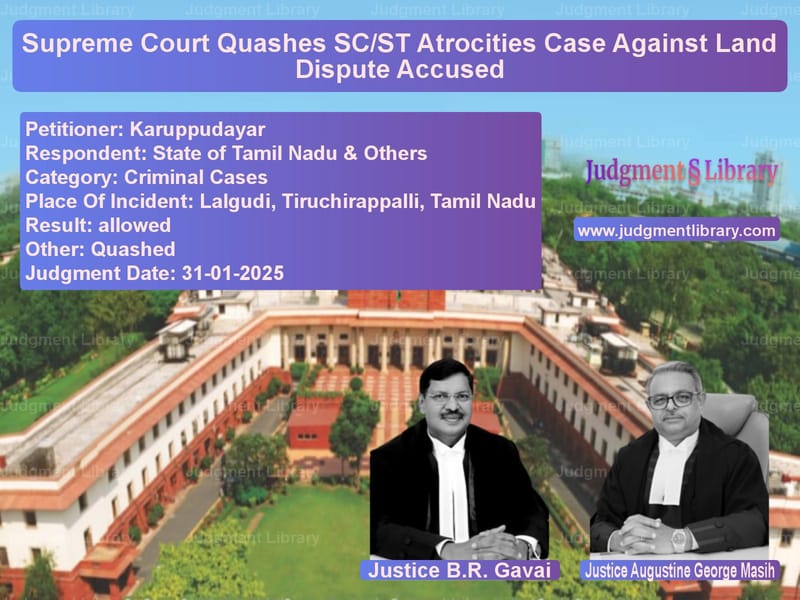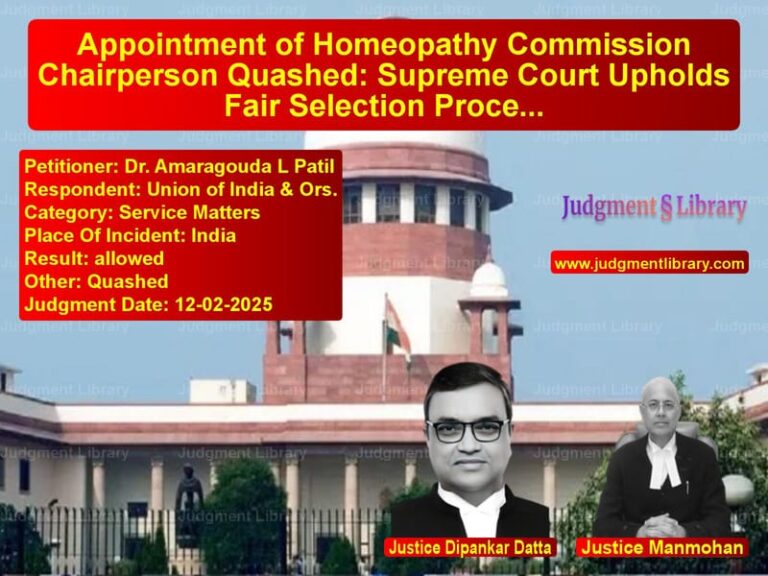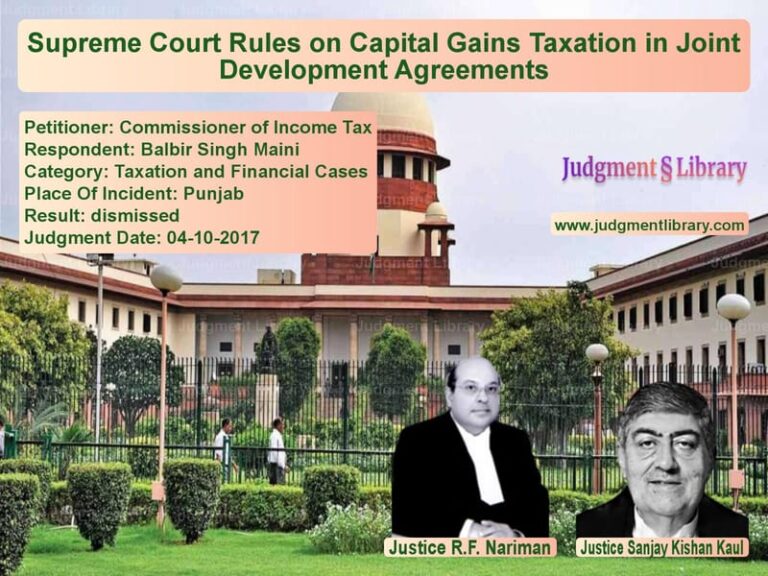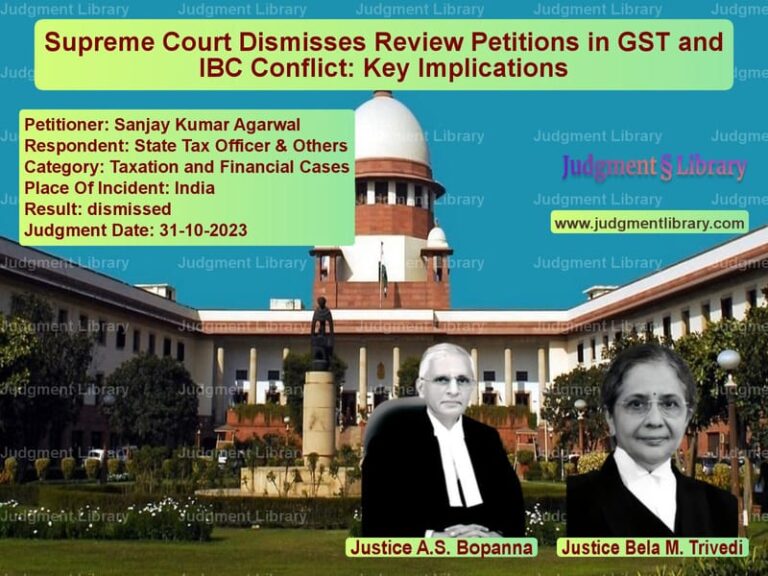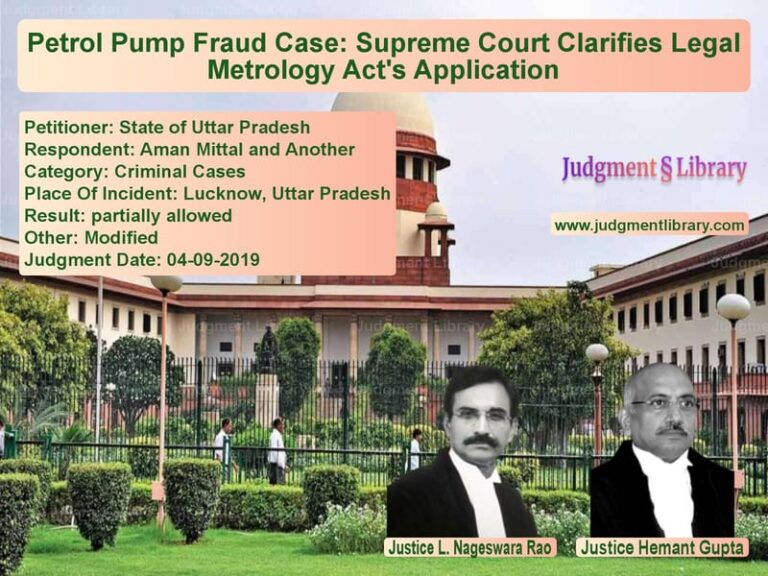Supreme Court Quashes SC/ST Atrocities Case Against Land Dispute Accused
The case of Karuppudayar vs. State of Tamil Nadu & Others revolves around an allegation of caste-based abuse under the Scheduled Castes and Scheduled Tribes (Prevention of Atrocities) Act, 1989. The Supreme Court was called upon to determine whether the case against the appellant, based on an alleged incident in a revenue office, met the legal criteria to sustain charges under the SC/ST Act.
The ruling clarifies the requirements for caste-based abuse cases, particularly the necessity of the alleged insult occurring in public view. The judgment reinforces legal principles protecting individuals from wrongful prosecution under special laws.
Background of the Case
The dispute arose when the appellant, Karuppudayar, approached a revenue officer regarding a land dispute involving his father’s name in the patta records. The prosecution alleged that a quarrel ensued, during which the appellant used caste-based insults against the official.
Chronology of Events
- September 2, 2021: Alleged caste-based abuse occurred in the Revenue Divisional Office, Lalgudi, Tiruchirappalli.
- September 3, 2021: FIR No. 676/2021 registered under Sections 294(b) and 353 of IPC and Sections 3(1)(r) and 3(1)(s) of SC/ST Act.
- 2022: Charge sheet filed, case committed to Special Court for SC/ST Cases.
- 2022: The appellant filed a petition in the High Court under Section 482 CrPC to quash the case.
- February 28, 2024: High Court dismissed the petition, stating that the case must go to trial.
- January 31, 2025: The Supreme Court reviewed the case and issued its final ruling.
Petitioner’s Arguments
The appellant, Karuppudayar, represented by senior counsel, argued that:
- The FIR lacked prima facie evidence of an offense under the SC/ST Act.
- For an offense under Section 3(1)(r) and 3(1)(s) of the SC/ST Act, the insult must occur in public view, which was not the case.
- The altercation took place inside the revenue office, a private space.
- There were no independent witnesses apart from the complainant’s colleagues, who arrived after the alleged incident.
- The case was a misuse of the SC/ST Act to settle a land dispute.
Respondents’ Arguments
The State of Tamil Nadu and the complainant, the Revenue Inspector, countered that:
- The accused intentionally insulted the complainant by using his caste name.
- The altercation occurred in an official setting, making it a matter of public concern.
- The revenue office, though indoors, is a government facility, and actions there are within public view.
- The charge sheet was filed after a thorough investigation.
- The High Court rightly refused to quash the case as a trial was necessary to ascertain facts.
Supreme Court’s Analysis
Key Observations
- “For an offense under Section 3(1)(r) and 3(1)(s) of the SC/ST Act, the insult must occur in public view. This means it should be witnessed by members of the public, not just colleagues.”
- “The alleged incident occurred inside a government office, where access was limited.”
- “Statements from the complainant’s colleagues indicate that they arrived after the incident, not during.”
- “Without public witnesses, the legal requirement for public view under the SC/ST Act is not met.”
Legal Precedents
The Supreme Court relied on previous rulings:
- Hitesh Verma v. State of Uttarakhand (2020): SC held that caste-based insults must occur in public view for the offense to be made out.
- Swaran Singh v. State (2008): Distinguished between insults made inside private offices and those made in public.
- State of Haryana v. Bhajan Lal (1992): Stated that FIRs can be quashed if allegations, even if true, do not constitute an offense.
Final Judgment
The Supreme Court ruled in favor of the appellant and held that:
- The FIR No. 676/2021 was quashed, as it failed to meet the public view requirement under the SC/ST Act.
- The charge sheet in Special S.C. No. 7 of 2022 was invalidated.
- The High Court’s refusal to quash the case was erroneous and was overturned.
Implications of the Judgment
This ruling has significant implications for SC/ST Act cases:
- Clarifies the meaning of “public view” under Sections 3(1)(r) and 3(1)(s).
- Prevents misuse of the SC/ST Act in private disputes.
- Sets a precedent for quashing baseless FIRs under the Act.
- Upholds individual rights against wrongful prosecution.
Conclusion
The Supreme Court’s decision reinforces the principle that special laws should not be misused. The ruling protects individuals from wrongful prosecution while ensuring that genuine cases under the SC/ST Act are properly prosecuted. By defining “public view” more precisely, the judgment sets an important precedent for future cases.
Petitioner Name: Karuppudayar.Respondent Name: State of Tamil Nadu & Others.Judgment By: Justice B.R. Gavai, Justice Augustine George Masih.Place Of Incident: Lalgudi, Tiruchirappalli, Tamil Nadu.Judgment Date: 31-01-2025.
Don’t miss out on the full details! Download the complete judgment in PDF format below and gain valuable insights instantly!
Download Judgment: karuppudayar-vs-state-of-tamil-nadu-supreme-court-of-india-judgment-dated-31-01-2025.pdf
Directly Download Judgment: Directly download this Judgment
See all petitions in SC/ST Act Case
See all petitions in Legal Malpractice
See all petitions in Judgment by B R Gavai
See all petitions in Judgment by Augustine George Masih
See all petitions in allowed
See all petitions in Quashed
See all petitions in supreme court of India judgments January 2025
See all petitions in 2025 judgments
See all posts in Criminal Cases Category
See all allowed petitions in Criminal Cases Category
See all Dismissed petitions in Criminal Cases Category
See all partially allowed petitions in Criminal Cases Category

